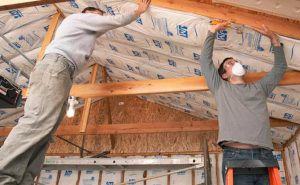
On the fence about insulating and heating your garage? Is it worth it? Are there zoning laws that require you to do it? While your area might require that any walls shared between an attached garage and the home itself have a common R‑value, there’s no law that says the entire garage needs to be insulated. What’s more, if yours is a detached garage, then there are no rules requiring any insulation anywhere.
So, if there aren’t any laws that force you to do so, why should you worry about it? Actually, it’s all about making your home that much more comfortable. For instance, chances are good that you use your garage for a few things during the year – DIY projects and the like. Chances are also good that all of those projects go on hold during the late fall and winter.
Insulating your garage and adding a heat source can help keep the area warm no matter what the weather outside might be doing. Of course, there are plenty of other great reasons to consider insulating your garage. Here are just six of them.
It’s Not “Just a Garage”
In the last few years, more and more people have come to the realization that their garage actually offers usable space, and that it can really be an extension of the home, rather than just a storage area or a place to park their cars. You can transform that garage into a workout room, a game room, a hobby room or workshop if you want. However, if you decide to go that route, you’ll definitely want to ensure that the garage is insulated so that you can maintain a comfortable, safe atmosphere throughout the year.
Cold Travels
You might not think anything about it, but if your garage isn’t insulated, the cold there will travel into your home even if the shared walls are insulated. Every time you open the door to the garage, heat is lost, increasing your utility bills. The same thing applies during the summer when the mercury climbs. Opening the garage door causes cool air to be lost, increasing your cooling costs.
You Might Not Have an Option
Perhaps you’re not terribly worried about the temperature in your garage. You don’t want to use that space for much of anything beyond storing your holiday decorations and tools. That’s all well and good in most instances, but if there’s plumbing in the walls or ceiling of your garage, you have to insulate it to prevent burst pipes when the temperatures get low. If you’ve added a room over the garage, you’ll also need to insulate it to prevent heating and cooling loss through the floor of the overhead room.
Safeguard Your Stuff
Insulating your garage is not just about keeping temperatures even. It also helps to moderate humidity levels. Moisture creates rust and can degrade any number of materials. Insulation helps you protect your belongings.
Prevent Carbon Monoxide Transfer
If you actually use your garage to store your vehicle, chances are good that you crank it and let it warm up inside during the colder weather. That’s great for convenience, but not so great for your health or that of your family. If your garage is not insulated and lacks good weather seals, carbon monoxide (a toxic gas) from the exhaust can make its way into your home.
Cut Out Noise
Do you notice that sound from outside travels into your home easily? It might be doing so through the garage. An uninsulated garage can act like an echo chamber, amplifying noise and transferring it to your home. By insulating the garage, you can cut out unwanted sound.
Insulate the Door, Too
While insulating your garage walls and ceiling will help, don't forget about the garage door. It forms a fourth wall, and insulation will help you save energy, maintain temperature and further reduce unwanted sound. If you insulate the garage, but not the garage door, you’re only doing half the job.
Get in touch with us today at 508-875-3508. We can help provide guidance on choosing the right type of insulation for your garage door, and we can even offer a free online quote. If you’re thinking about replacing your garage door, check out our Design Centre to customize one to your needs, or view your options in our image gallery.










Add new comment